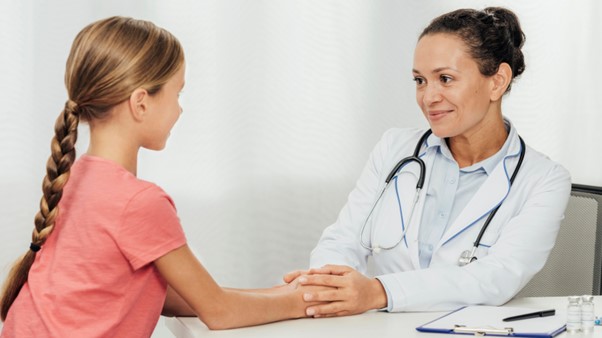What is Delayed Puberty in Girls?
Delayed puberty in girls means that the usual signs of puberty do not appear by age 13. Puberty is when a child’s body starts to change into an adult body. Usually, girls start puberty between ages 8 and 13. However, if these changes do not begin on time, it may be a sign of delayed puberty in girls. This condition can cause worry for both girls and their families. In the United States, delayed puberty is not rare, and early care can help.
Common Symptoms of Delayed Puberty
It is important to know the signs of late puberty. Early detection can help with treatment. Some common symptoms include:No breast development by age 13No growth spurt by age 13No pubic hair by age 14Periods have not started by age 16Shorter height compared to classmates
Sometimes, girls may feel left out or worried because their friends are changing, but they are not. For this reason, support from family is very helpful.
Causes of Delayed Puberty
There are many causes of delayed puberty in girls. Some are simple and not serious, while others may need medical care. Common causes include:Family history of late pubertyChronic illnesses like diabetes or celiac diseaseLow body weight or eating disordersIntense physical activity, such as in athletesHormone problems, such as low estrogenGenetic conditions, like Turner syndrome
In many cases, delayed puberty runs in families. However, sometimes an underlying health issue is the cause. Therefore, a doctor’s checkup is important.
How Delayed Puberty is Diagnosed
Doctors use several steps to diagnose delayed puberty in girls. First, they ask about family history and health. Next, they do a physical exam. After that, they may order tests, such as:Blood tests to check hormone levelsX-rays to see bone growthOther tests to look for health problems
Sometimes, doctors may refer the girl to a specialist. Early diagnosis helps find the cause and start the right treatment. According to the CDC, early care leads to better outcomes.
Treatment Options for Delayed Puberty
Treatment for delayed puberty depends on the cause. In some cases, no treatment is needed, and puberty starts on its own. However, if there is a health problem, doctors may suggest:Hormone therapy to start pubertyTreating underlying illnesses, like diabetesNutrition support for healthy weight gainCounseling for eating disorders
Doctors will explain the best treatment plan for each girl. With the right care, most girls go through puberty normally.
Lifestyle Tips and Support for Families
Families play a big role in helping girls with delayed puberty. Here are some helpful tips:Encourage healthy eating and regular mealsSupport regular, gentle exerciseTalk openly about feelings and worriesSeek support groups if neededStay in touch with healthcare providers
Above all, remind your child that everyone develops at their own pace. With support, girls can feel more confident during this time.
Prevention and When to Seek Help
In many cases, delayed puberty cannot be prevented. However, keeping a healthy lifestyle and treating illnesses early can help. If you notice signs of late puberty, talk to a doctor. Early help can make a big difference. You should seek help if:No breast growth by age 13No periods by age 16Sudden weight loss or gainOther health changes or concerns
Remember, every child is unique. But, if you have concerns about delayed puberty, consult a healthcare specialist for personalized advice.

